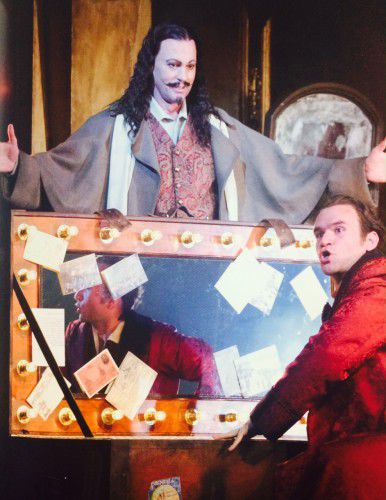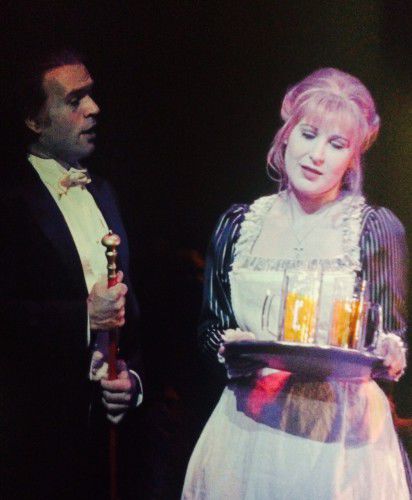WHEN David McVicar’s production of “Don Giovanni” took the stage at Sydney Opera House last year, the general consensus was that it was the best thing OA had in its repertoire.
Right now, you’d have to say that his production of “Faust”, one of the most ambitious undertakings for the company a long time, has edged “Don Giovanni” out of position, although both leave Teddy Tahu Rhodes at centre stage as respectively the Don and Méphistophélès.
It is McVicar’s uncanny capacity to make every moment of an opera seem real that makes him a winner as an operatic director even though, if you think about it, both operas turn on exceedingly improbable plots.
This “Faust” is, of course a reconstruction of a hugely successful production McVicar staged at the Royal Opera House Covent Garden.
Small matter that he transposes the story from mediaeval Germany to late 19th-century France – that after all is where it was first performed in 1859, and it allows him to have a lot of fun exploring the diabolical forces in the recreation of the cabaret from hell, quite literally “Cabaret L’Enfer”.
But it’s not all devilish beer-drinking and dancing, for at the conclusion of this “Faust”, the sense of moral degradation is palpable. This I have never experienced in an operatic “Faust” or in the more optimistic “Faust” by Goethe and only rarely in Christopher Marlowe’s “Dr Faustus”.
By depicting Méphistophélès as a seedy Laughing Cavalier inflicting a good time on everyone as seen in “Le veau d’or”, McVicar not only renders Teddy Tahu Rhodes totally unrecognisable, but he sows the seeds of evil into the production, so that even the innocent Marguerite, played and sung affectingly by Nicole Car, seems contaminated until the very final moments of the opera.
Two unorthodox scenes stand out – the Act IV scene set in the Church of St Severine where Méphistophélès steps out of a stationary group of statues as Jesus himself to heap his ‘divine’ curses on Marguerite.
The second is the notorious Walpurgis Night scene, where McVicar picks up on Gounod’s lovely music, undercutting the sweetness to create a mounting orgy in which Michael Keegan Dolan’s arresting choreography plays a significant part.
If there is one weakness in this production, it is in Faust himself, sung with great beauty by American tenor Michael Fabiano. Unfortunately, alongside Méphistophélès, Marguerite and even her brother Valentin, (Italian baritone Giorgio Caoduro) he seems a hopeless wimp. Indeed, McVicar resorts to the technique of turning Faust into a junkie, a dramaturgical copout if ever there were one.
Disturbingly dark and thought-provoking as this mighty opera proves, the performances themselves give hope of a brighter future for OA than has recently been predicted. Tahu Rhodes dominates the stage, vocally and dramatically as the mercurial Mephisto, all things to all people, Car touches the heart and Anna Dowsley brings a rare note of humanity to the role of her hapless suitor Siebel.
I’ve saved the best until last – the star of this production is surely the Opera Australia Chorus, trained by Anthony Hunt. Visible in early scenes as assorted townspeople, soldiers and demonic figures, they seem to disappear, only to resurface. clad in black, high in The Gods of the House for the final glorious vocal confirmation that Marguerite’s soul will ascend to heaven.
It is rare enough to see a production of “Faust” anywhere, but this is a “Faust” not to be missed. An additional performance has been announced for Monday, March 9 at 6.30pm, but the opera will close on March 13. Bookings to opera.org.au or 02 9318 8200.
The post Disturbingly dark and thought-provoking: OA’s ‘Faust’ appeared first on Canberra CityNews.


